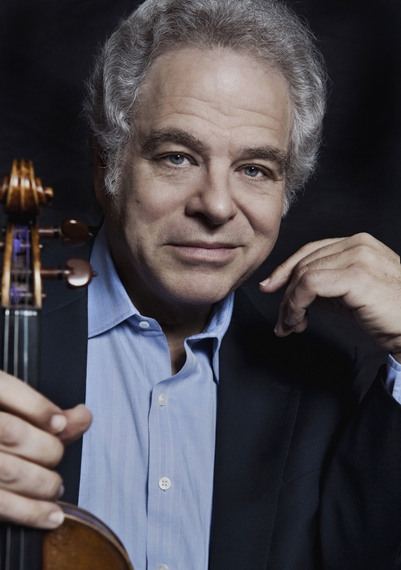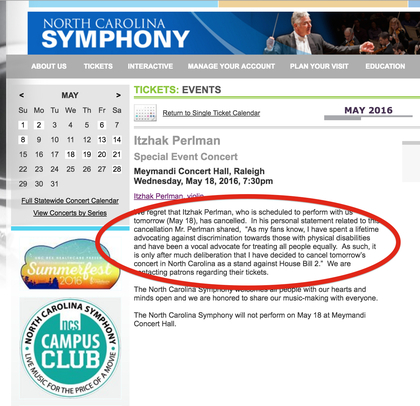When an acclaimed classical musician joins hands with the likes of Bruce Springsteen, Pearl Jam and Ringo Starr, people listen. But it's silence they're getting from this ensemble.
World-renowned violinist Itzhak Perlman walked away from playing a concert with the North Carolina Symphony on May 18 after originally mulling it over and deciding he would go ahead and play so as not to punish the other 66 musicians. He would donate his fee to Equality North Carolina and play the gig on one condition: a printed statement in the concert program explaining his stance against the so-called "bathroom bill," House Bill 2 signed into law by Governor Pat McCrory in March.
As a conductor-violinist who uses crutches and often plays seated in a motorized chair, Perlman's enthusiasm for the rights of people with disabilities is not only logical, it is also well established. But his activism-by-extension to LGBT sensibilities isn't arbitrary. "One of my daughters is gay, so it's not something I'm looking at as a distant observer. I want to lend my solidarity to this - this or gay marriage or anything related to this subject," he told the Huffington Post in a phonecall.
"I said I'd like to insert a page in the program with a little statement saying how I feel about it," Perlman explained. "And as long as this law still exists on the books, this would be my last visit to North Carolina until the law is repealed."
Referred to alternately as "HB2," the "bathroom law," and the "common sense bill" (by some proponents), the Public Facilities Privacy & Security Act limits anti-discrimination policies that would protect LGBT people, excluding lesbian, gay, bisexual and transgender people from non-discrimination laws. It goes further to block city governments from offering protections that would exceed the state's limitations. The nickname is derived from a requirement that individuals use public restrooms corresponding with the gender indicated on their birth certificates.
Co-founder of the Chicago-based Gay Liberation Network Andy Thayer analyzed HB2 in the context of history, examining the gains of the civil rights movement of the '60s in terms of public accommodation for African Americans whose rights have been eroded by subsequent legislation. He asserted that bathroom laws in Texas used wedge issues to dissolve public access to abortion. "The North Carolina law is ostensibly about bathrooms, but it's rolling back all rights for LGBT's and, by extension, rights for women ... reproductive choice," he said. "These 'separate' issues are never far in the background."
Citing a six-to-three ruling in a 1996 Supreme Court decision, Thayer recalled that a state constitutional amendment in Colorado aimed at preventing protected status on the basis of bisexuality or homosexuality didn't pass the test for a rational relationship to state interests. He was incredulous that in light of such a ruling, state laws could get this far. "The justices involved in that decision still represent a solid majority who reject this nonsense that North Carolina just passed. Yet nobody's talking about it."
The day before the concert was set to happen, Perlman received a call from NCS management with the news that his personal statement would not be permitted after all. "I was ready to go and also ready to donate my fee to Equality North Carolina which takes care of the LGBT society and a host of anti-discrimination causes," he recounted. "But when they said I can't express myself in the program, I said, 'That's it.'"
NCS Vice President for Marketing and Audience Development Linda Charlton sent HuffPost the official statement via email:
"The North Carolina Symphony welcomes all people with our hearts and minds open, and we are honored to share our music-making with everyone. However, as a non-partisan organization, our performances are not an appropriate forum for political commentary."
The affable string player appreciated that the NCS was in an "uneasy situation" but retorted, "When they're supported by an entity that's partisan, calling yourself bipartisan is not exactly accurate." Furthermore, "if you're non-partisan, there's free expression."
Charlton said by phone that the symphony received $4.07 million in funding from the state for the 2015-2016 season. According to the NCS community report, that's 26 percent of the total operating budget for the year.
Perlman posted a statement on his Facebook page that was repeated on his website:
"As my fans know, I have spent a lifetime advocating against discrimination towards those with physical disabilities and have been a vocal advocate for treating all people equally. As such, after great consideration, I have decided to cancel my May 18th concert in North Carolina with the North Carolina Symphony as a stand against House Bill 2. As Attorney General Loretta Lynch recently stated, HB2 'is about a great deal more than just bathrooms. [It] is about the dignity and respect we accord our fellow citizens.' I couldn't agree more and will look forward to returning to North Carolina when this discriminatory law is repealed."
Interestingly, Perlman's Facebook announcement, which is not unlike what was forbidden to appear in the printed program, was included on the NCS website with the symphony's notice of cancellation and the uncritical portion of their official response.
The 70-year-old virtuoso is unlikely ever to wilt from a blast of political heat or even personal adversity. Born in Palestine in 1945 to Jewish parents from Poland, Perlman's Tel Aviv would become the seat of government for the newly declared Israel at about the time he contracted polio. He was four years old, but already he was showing promise not only as a natural musician but also as an individual with the will to persevere. A boy on crutches, Perlman gave his first concert at 10.
Perlman recalled a time when it was incumbent upon him to decline engagements in South Africa due to apartheid. He also refused work with Herbert von Karajan for the Austrian conductor's former ties to the Nazi Party.
Yet he demurred on stating his personal position toward the BDS Movement that espouses the boycott of, divestment from, and sanctions against Israel for policies ill-affecting Palestinians, calling for "full equality for Arab-Palestinian citizens of Israel."
"That I keep to myself," Perlman responded. "About the whole situation in Israel, I always say to people that I'm optimistic." Noting that the issues are "difficult," he admitted there are some policies he agrees with more than others, but that those matters are already getting plenty of attention from others. "I'm talking about the country of my birth."
As for the decision not to play his engagement in the Old North State, Perlman said he feels he did the right thing. "One cannot make a general rule that if you're an artist, you have to express something. But if it's something that talks to you, do it. ... I'm hoping my statement and my action and the actions of others in the entertainment business and other sectors will move people in the state of North Carolina to repeal this law."
From Wikipedia
"The Public Facilities Privacy & Security Act, officially called An Act to Provide for Single-sex Multiple Occupancy Bathroom and Changing Facilities in Schools and Public Agencies and to Create Statewide Consistency in Regulation of Employment and Public Accommodations, but commonly known as House Bill 2 or HB2, is an act passed in the U.S. state of North Carolina in 2016. It has been described as the most anti-LGBT legislation in the United States."

